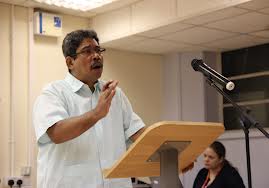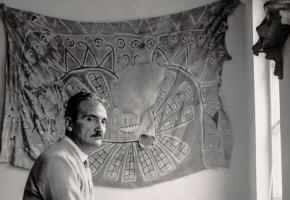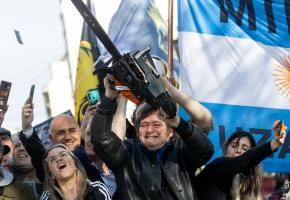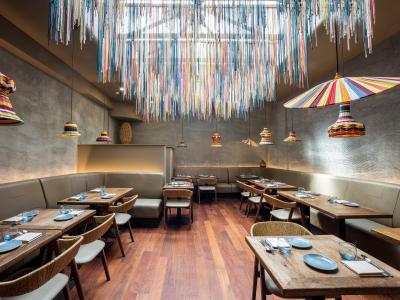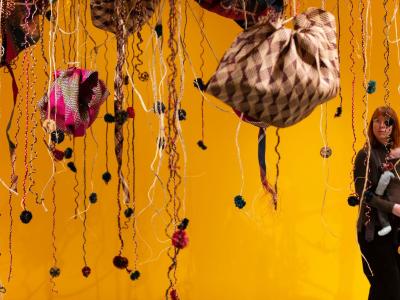My name is Carlos Arturo Cruz García. I was born on the 27th April 1956 in Armenia, capital city of Quindío Department, a coffee producer region in Colombia. I am the youngest of 6 brothers and sisters. My parents and grandparents had they roots in this south-western region, formerly called el “Viejo Caldas”. For many generations the members of my family were farmers, coffee and plantain producers with very low educational levels. They were also very catholic, and thus really conservative.
My earliest memory comes to me from time to time. I see myself, a 2 years old child, wrapped from neck to toes in a wool blanket – I even remember it had white and blue stripes – all my small body, including my arms were strongly tided up, which according to my mum was supposed to protect me from the cold, mosquitoes and perhaps other kind of animals visiting my bed in the night time. It was a horrible and uncomfortable feeling… lying in bed, all rigid and hot, looking at the ceiling were my mum’s and dad’s shadows were projected by the candle flame. That is why my early mornings were my most precious gift. Since my primary school years to the present day I have been involved in community activities.
At school I used to confront the teachers who punished their students using medieval methods. As I was growing up, I confronted injustice wherever I saw it. Organising sport, cultural and academic activities was usually my responsibility. On the other hand, I was engaged in the students’ union, coordinating different activities alongside the tutors and parents. In college I founded a student union and was the leader of the first student strike in support of the tutors’ collective protests.
As student at the University of Quindio I always defended the rights of the academic community against local and national government’s wrong education policies. But this was just one part of my involvement in community activities… I combined the academic struggle with the “Juntas de Acción Comunal” (Groups of Community Action) working with the poorest. In the late 70s I went to Manizales, the capital of Caldas Province, where I spent a couple of years as a community and political organizer. By then I had become an itinerant political activist in the Colombian opposition movement. I believe that a community leader is equally a political leader as both aspects are inseparable. In Manizales I had the opportunity to meet many important people. Some of them, like for example Jorge Enrique Robledo, a congressman representing the Colombian opposition movement, are well known today in the national political arena. Others went to exile, disappeared or were killed by the government’s or right wing’s death squads. In the early 80’s in Pereira, capital of the Province of Risaralda,
I got involved in a massive popular housing project called “Destechados Camilo Torres” aimed at helping the poorest people. We managed to develop the project and provide housing to a good number of people until 1984, when the government and rightist political parties pushed us out. As I said before, traditional politicians didn’t want to see us helping the community, because it didn't give them profits. Then I went to the Department of Caquetá in the Amazons Region of Colombia were I got employed as a rural teacher. What I saw there was shocking. The living conditions of farmers and their families were inhuman and degrading. There was no drinking water or electricity. The school was just an almost collapsed cottage without doors, where cows and donkeys used to sleep. The nearest village with a health centre was 4 hours away by motorboat. The children from the first and second primary school grades were all over 9 years old. They usually were sick or didn’t attend regularly as they had to help their parents at work to get enough income to survive. There were no teachers for a long period, due to the internal conflict and permanent confrontation between military, paramilitary and guerrilla forces. It was also a land of coca leaves plantation lords, who use violence to control the business. I was in the middle of all this and so, an easy target if anything went wrong.
The community became my main concern and I started by organising the Group for Community Action. We ended up preparing a big community event with delegates from the regional government authorities and institutions. There were health brigades attending children with vaccines, immunisation and dental treatment. Our aim was to attract the attention of the departmental government to solve the problems and fulfill the needs of the community. We presented a memorandum to the government delegates which included a demand to create an access road to the region, a proper school, provide drinking water and electricity. It was the first time that something of this nature has taken place in the village so the community was really happy and hopeful. However, soon afterwards I had to leave, because I was threatened by some people who didn’t want to improve the living conditions of the community.
I moved to UK in 1991. Since then I have dedicated my time to helping the Latin American community in Great Britain, especially in London. For many years my chief preoccupation has been the migrant community. I have worked both on my own and for organisations, as a volunteer or a paid employee. Today, as a Union Leaning Organiser in Unite the Union, I coordinate the UMWEP program designed to help and support the members of the union from any background and/or nationality. This education project is now an open space for all the communities in London. During the 7 years more than 3000 people have attended its courses which include ESOL from beginners to Level 1, English Literacy and Functional Skills, English Pronunciation, Language Exchange, ICT basic and intermediate, Maths for every-day life, Arts and Media, Drama and Latin American Folk Dancing, and many other complementary, specialised workshops, including Summer School Seminars.
I do not conceive a better, equal and socially just world without free and quality education for all. This is a universal human right mandate stipulated in the Universal Declaration of Human Rights and signed by all the UN members. Unfortunately the majority of the world´s population has been excluded from the conventional education system, even on a primary school level. This leads to social inequality and the increasing gap between rich and poor.
Migrant workers are one of the most vulnerable social groups, and that is why I really enjoy supporting them. What I like about Unite is that we can make a difference in lives of our learners. I appreciate the spirit of solidarity of the volunteer tutors, their dedication to help the community. It hurts me and upsets that the government and official education institutions reduce dramatically the adult learning budget and even close the community learning centres. One of the greatest obstacles we have to overcome is the tremendous instability and precarious work conditions of migrant workers, who even at weekends don´t have enough time to attend classes. Another problem is the employers´ reluctance to give their workers´ time off. It is also the culture of formal education which prevents people from truly appreciating informal learning. In 2010 UMWEP was on a brink of disappearing due to the cuts on public expenditure. Thus the learning providers could not continue supporting our project. We dealt with the problem creating what is now our Alternative Education Model, based completely on volunteer tutors and an informal conception of pedagogical methods which brought more flexibility and interaction between tutors and learners. In general the British don´t believe in the informal education and all the ways of acquiring knowledge that don´t fall within the traditional education system.
What has kept me driven is the conviction that there is always a place for those who had lost hope of learning in the conventional education and that the Alternative Education Model is the right path to reach more beneficiaries across the country and beyond. What makes me happy is serving the community. I feel unhappy when I think that the work I do without resources, is actually the responsibility, the duty of the government. It has not only the duty to do it but also the resources. The living person I most admire is my wife Nelly. Her strength and solidarity has been crucial in my life. If I could pick a song for my funeral it would be “Caminante no hay camino” by Joan Manuel Serrat. I will continue my job here or wherever I go, trying to improve what is done so far, learning from the mistakes and day to day experiences. This is a constant process with no ending and no standard patterns. I see myself working, writing and reading till my last day, but where? I cannot predict this yet.


